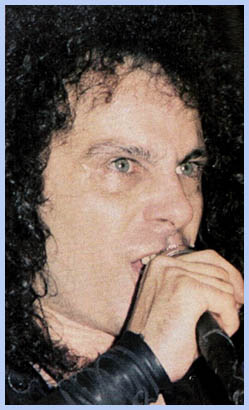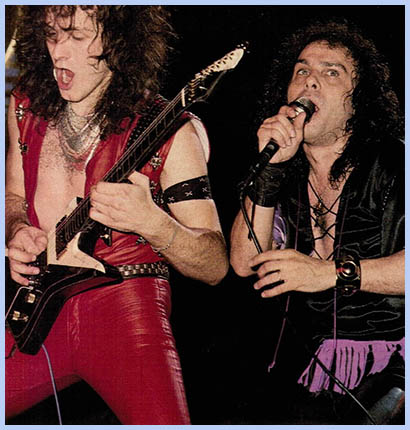|
RONNIE JAMES DIO Dio's Back On Top  If a set of Tarot cards were ever stacked in favor of a successful heavy metal career, "The World" card would have the name Ronnie James Dio written on it in gilt-edged letters. As the very heart and soul of
two of metal's most respected founders—Rainbow and Black Sabbath—the diminutive Ronnie James Dio has become the gargantuanlunged role model from whom many of today's vocalists/frontmen draw their very lifeblood.
If a set of Tarot cards were ever stacked in favor of a successful heavy metal career, "The World" card would have the name Ronnie James Dio written on it in gilt-edged letters. As the very heart and soul of
two of metal's most respected founders—Rainbow and Black Sabbath—the diminutive Ronnie James Dio has become the gargantuanlunged role model from whom many of today's vocalists/frontmen draw their very lifeblood.Born in Portsmouth, N.H., while his father was winding up a military tour, Ronald James Padovana grew up in Cortland, N.Y, a small college town near Syracuse. Music came to Ronnie at an early age (5), when his father removed him from his beloved sports fields and stuck a trumpet in his mouth. But despite showing no small amount of prowess on that instrument, it was a much harder style of music that would soon become Ronnie's calling card. Claiming his career began at 10, Ronnie soon changed his name to Ronnie James Dio (Dio means "God" in Italian) and put together a succession of popular local acts: Ronnie Dio and the Prophets, the Electric Elves, the Elves and finally, Elf. It was Elf, which consisted of Ronnie, Mickey Lee Soule, Gary Driscoll, Graig Gruber and Steve Edwards, that was to be the first real stepping stone in Ronnie's career. "What happened was, we were playing in this place in Binghamton, N.Y., and a guy from CBS came in and liked what he saw," recalls Ronnie. "So we went to New York City and auditioned for Clive Davis along with Deep Purple's Roger Glover and Ian Paice, who were interested in producing the band. All three of them liked what we did, and we got a recording contract. Roger and Ian then produced our first LP, which was simply called Elf." Perhaps just as strong a prophecy of what was to come was Ronnie's decision, prior to recording Elf, to drop the bass guitar and step into the limelight as a frontman. "I felt that you can do one thing better than you can do two things, explains Ronnie. "I always like to be the best at what I do. So I thought it was about time that I stopped hiding behind my bass and just go for it — be a vocalist and frontman." The next card that Ronnie was dealt—the vocal spot in Rainbow — stemmed from his association with one especially colorful member of what Ronnie fondly terms the "Purple Family," Ritchie Blackmore. Ritchie had just finished his final appearance with Deep Purple (Mark III) at the Paris Olympia on April 7, 1975.  "I had gotten to know Ritchie very well," says Ronnie, "and when he left Deep Purple, he came to me and asked me if I would put together a band with him. I told him I would if he took my players [Elf] as well, because I had a lot of allegiance and loyalty to them and I wasn't about to leave them by the wayside. And I guess he wanted me badly enough because he agreed."
"I had gotten to know Ritchie very well," says Ronnie, "and when he left Deep Purple, he came to me and asked me if I would put together a band with him. I told him I would if he took my players [Elf] as well, because I had a lot of allegiance and loyalty to them and I wasn't about to leave them by the wayside. And I guess he wanted me badly enough because he agreed."So 1975 spawned Ritchie Blackmore's Rainbow, which was essentially Elf (who oddly enough had a song in their repertoire called "Rainbow") plus Blackmore. Rainbow released their self-titled debut later that year, featuring two of Ronnie's song spectaculars, "Man on the Silver Mountain" and "Snake Charmer." But Ronnie's association with the Strat-slinging Blackmore was to end in 1978. "It got to be a matter of my not wanting to do the music that I was being asked to write in Rainbow," says Ronnie. "I didn't write love songs, and that's what they felt the success of Rainbow was attributed to. So it became time for me to part company with them and let them carry on and become Foreigner Jr.; I wanted to live my own life." Ronnie's departure from Rainbow was as simple as that, a disagreement over material—or was it? Confronted with a thick shroud of mystery surrounding the Dio/Blackmore divorce, rock journalists went blazing down a trail of bloody rumors concerning a titanic clash of egos (a clash of titanic egos?) over which man properly belonged on a particular 1977 magazine cover. "That may be what Ritchie believes was the problem," snaps Ronnie, "but I think if that were the case it would show a very small mind. I never had that kind of ego, and I still don't have that kind of ego even though I'm accused of it all the time. It was Ritchie who made it happen in the beginning; he's the one who gave me the chance for success, and I have nothing but praise for him. If that's Ritchie's particular end of it, then he's a fool. But I'm sure it's not, because he's not a fool." With Rainbow behind him, Ronnie answered the call of old friend Tony Iommi, whose band had just lost manic-vocalist Ozzy Osbourne for the second and final time. Iommi, the fretburner behind one of British metal's most important bands, was planning to leave Black Sabbath for what promised to be a disastrous career with Jethro Tull but when Ronnie hit it off so well with Bill Ward and Geezer Butler, the four of them decided "it would be stupid to let go of the Black Sabbath thing." Sabbath regrouped, and set out on an era that produced, perhaps, Ronnie's greatest vocal achievement — the ripping Sabbath LP Heaven and Hell. However, despite the success of that album, Ronnie was to leave Black Sabbath in 1982 upon the release of the notorious Live Evil album. In what was to be one of the most viciously publicized splits in the history of heavy metal, the accusations flew over what happened during the production of Live Evil. For what's supposed to be an easy job — getting out a live record — Live Evil suffered through five months of studio time; "thousands" of overdubs; poor keyboard tracks; a lawsuit over the cover; and an extremely late release date that put the album in direct competition with Ozzy's just - released live epic, Speak of the Devil. Further grief came from Iommi's and Butler's alleged claims that Ronnie went into the studio and turned up the mix on his vocal tracks and Vinny Appice's drum tracks. In turn, Ronnie was quoted as saying that Iommi and Butler went in and turned down his and Vinny's tracks. The final blow, however, came when the album jacket appeared with the credits no longer in alphabetical order as they had been on every previous LP; Vinny listed under a "Special Thanks" heading behind non-entity keysman Geoff Nicholls, and Ronnie "purposely" listed as Ronnie Dio, not by his professional name Ronnie James Dio. "[Their stories] are all a load of rubbish," says Ronnie, "that's their end of the truth. I guess they had to find some kind of story to cover their tracks. There's no truth in it, because I would never do anything like that! As I've said over and over again, all you have to do is listen to Live Evil and look at the credits, you'll find out where it's at!" But as grim as Ronnie's past has been, he has gathered up those experiences and used them to guide what is turning out to be the most successful conglomeration of his career — the current Dio band. "I think [the past] has made it much easier for me," notes Ronnie. "All those things with Rainbow and Sabbath were great helps for me. I saw all the mistakes that happened, and I saw all the right things that happened and I tried to assimilate them all and use them for my present situation." The present situation for Ronnie James Dio is strutting across Europe and America with a white-hot band, pushing a red-hot album titled The Last in Line (Warner Bros). Crawling out of the train-wreck that was Black Sabbath in 1982, Ronnie was followed by fellow passenger Vinny Appice, an easy move for Vinny, considering the way he was apparently treated by Black Sabbath. Jimmy Bain, Ronnie's heavy-gauge string-pulling friend from Rainbow, was the next to be recruited for Ronnie's band. Bain, a native of Newtonmore, Scotland, had played in a band called Harlot prior to joining Rainbow. All Ronnie needed was an axeman of talent equal to the rest of his gathering.  "Jimmy, who is my best friend," explains Ronnie, "suggested this guy named Vivian Campbell that he had heard play in Ireland. He told me Viv was very young, which is what I was looking for, so while in London, Vinny and I contacted Viv, flew him in from Belfast, and had a play with him. He was great right off the bat."
"Jimmy, who is my best friend," explains Ronnie, "suggested this guy named Vivian Campbell that he had heard play in Ireland. He told me Viv was very young, which is what I was looking for, so while in London, Vinny and I contacted Viv, flew him in from Belfast, and had a play with him. He was great right off the bat."The result of Dio's first effort, 1983's Holy Diver (Warner Bros), was a gold record and instant recognition. "We called the band "Dio" for the instant recognition, and we got it," says Ronnie. "But we were a band when we started, and we are a band now I'm not alone out there!" Like Holy Diver before it, Dio's latest release, The Last in Line (certified gold after a brief 11 weeks), was produced by Ronnie, who wrote all of the material either alone or in collaboration with other band members. But unlike Holy Diver, The Last in Line shows a much more polished foursome who have worked out a tight metal sound that is decidedly their own. "We are a lot more mature now," says Ronnie, "but I don't think musically we have made any incredible changes. I always write what comes from my mind, from my heart and my soul. I don't try to write conceptual pieces or albums, I just try to write music that I like and that the people I've always played for like. We've become much better at the production end of it, and as far as the playing end — well, after doing the first LP without ever playing together before, the band has now had a year and a half. With any future albums and tours almost guaranteed to be well received, only one question remains to be asked: Can Ronnie James Dio hold onto his sweet situation, or will the next story of a band-on-the-rocks come from the Dio camp? "I try not to be a pessimistic person," concludes Ronnie. "I try not to look back at the lows. I just look forward to enjoying myself with what I do, with what I love. And there cannot really be too many low points if you're doing what you love." © Michael Smolen, Circus Magazine - December 31, 1984 |
